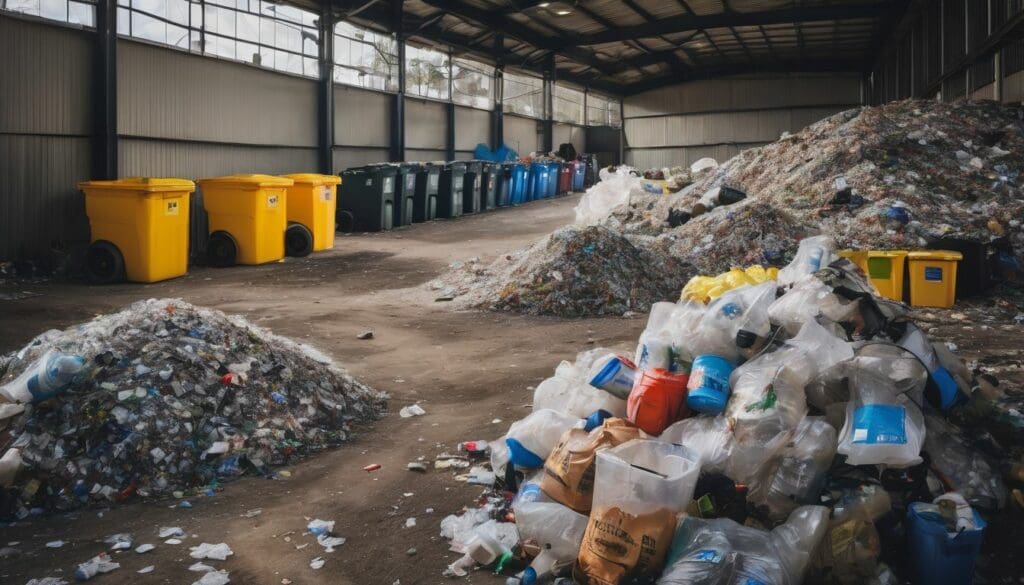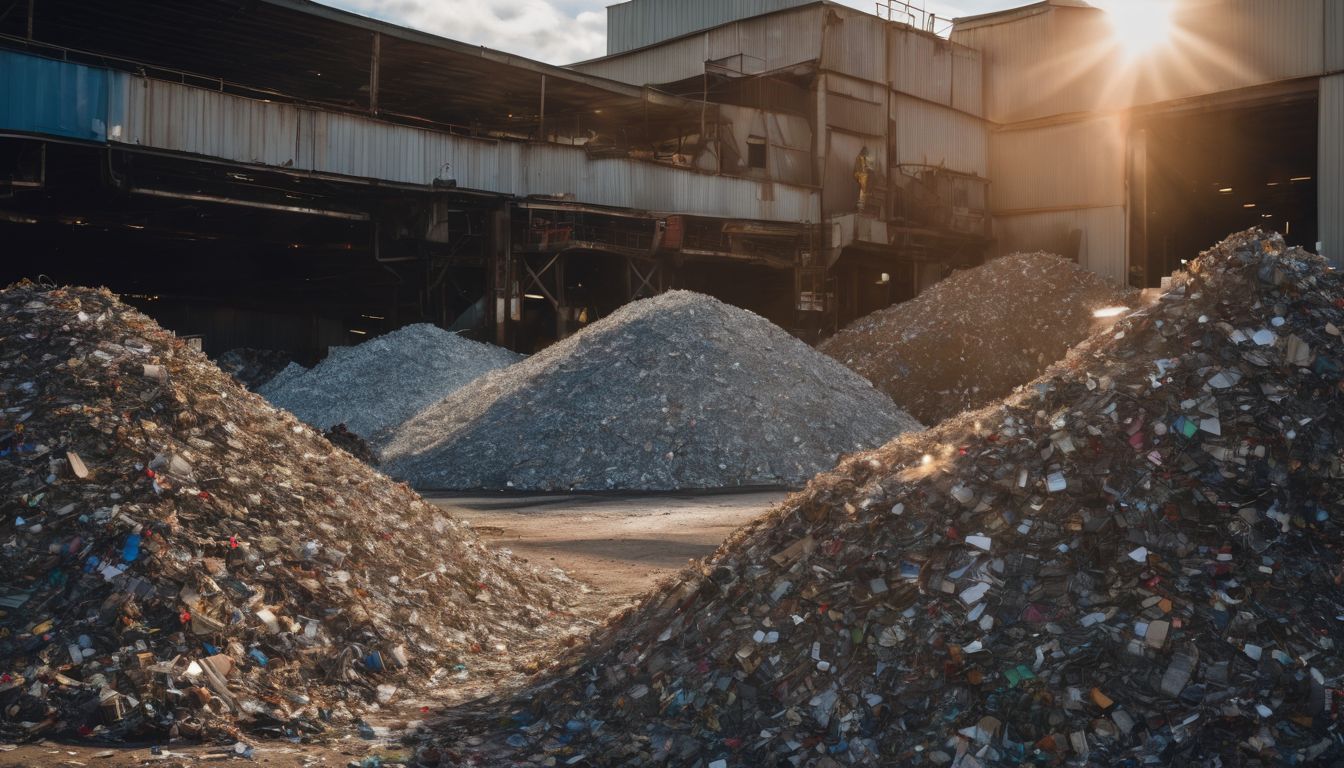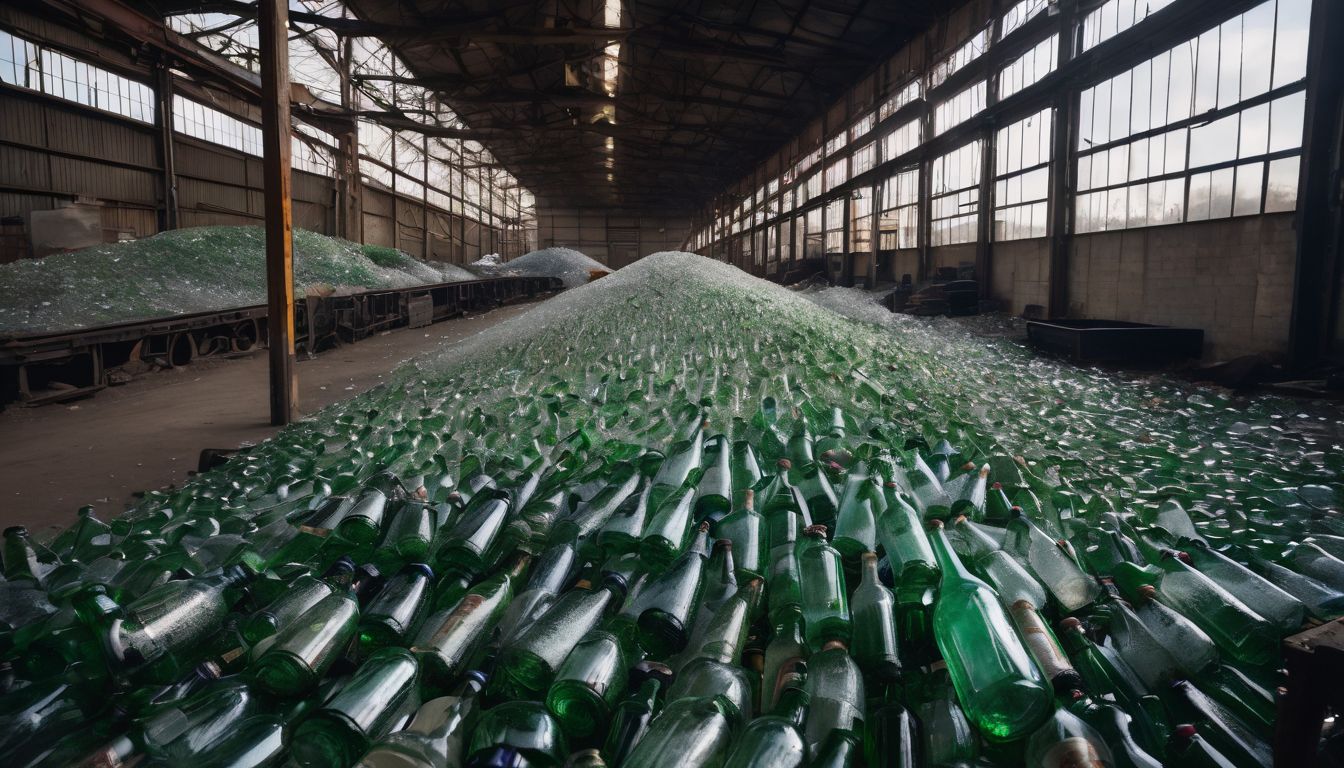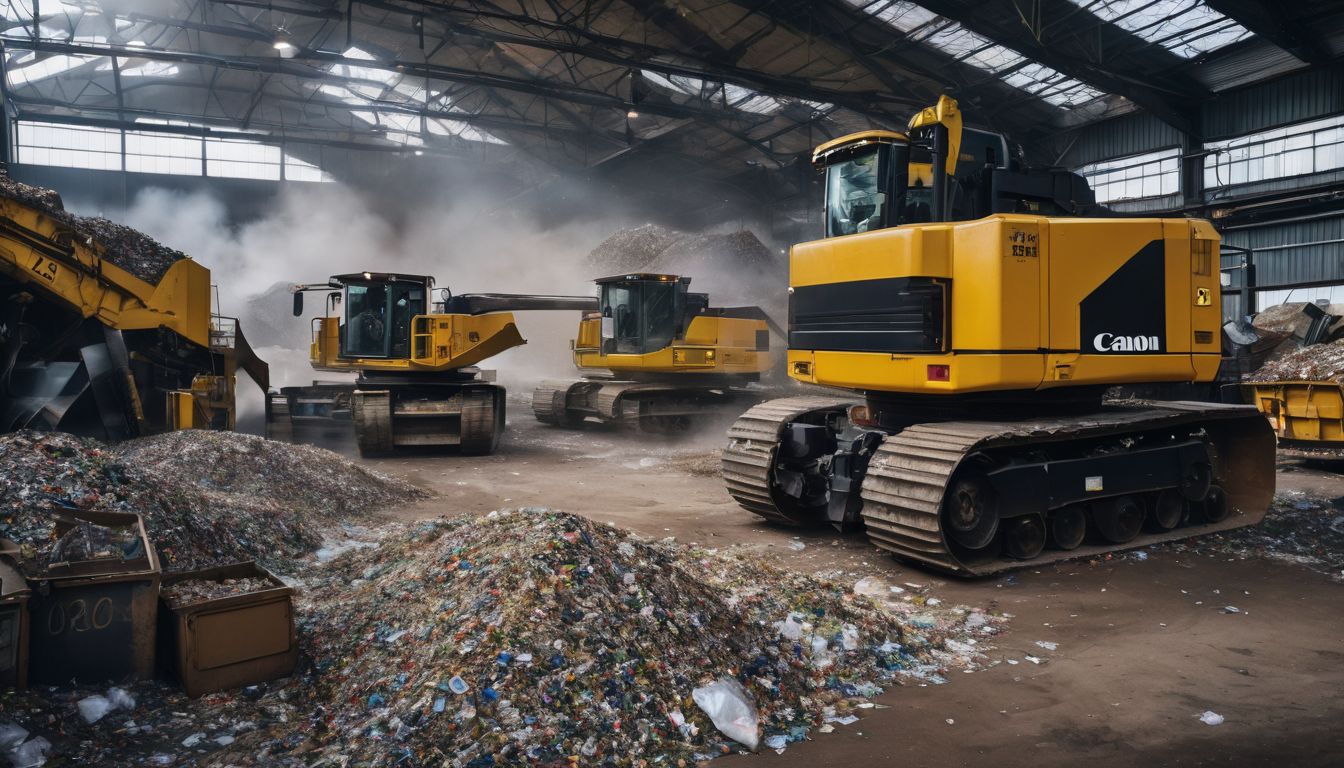You’ve just finished a big home clean-up and now you’re stuck with items you can’t toss in the bin. Did you know that each year, our homes produce a substantial amount of hazardous waste that requires special handling? This article will guide you through safe disposal practices for those tricky waste items, ensuring they don’t harm the environment or your community.
Let’s keep it safe and green!
Key Takeaways
- Hazardous Household Waste includes items like batteries, pesticides, and electronics that can harm the environment if not disposed of correctly. Safe recycling methods protect both human health and natural resources.
- Local laws may allow certain HHW to be disposed of with regular rubbish; however, specialised disposal is required for items such as asbestos, medicines, and sharps.
- Recycling options are widely available for products such as paint, electronic devices, and automotive fluids. Donation programmes also encourage reusing items instead of adding them to landfill.
- Collection facilities provide a safe way to dispose of HHW by offering resources like pickup services and drop-off events. National and local programmes educate on proper disposal practices.
- Storing hazardous waste safely involves using clearly labelled containers kept away from children and pets. Unused medications should be taken back through authorised collection sites rather than thrown away or flushed down the toilet.
Understanding Household Hazardous Waste (HHW)
Household hazardous waste (HHW) refers to any discarded materials that can pose a threat to public health or the environment if not handled properly. Examples include batteries, pesticides, cleaning products, and electronic waste.
Definition and examples
Hazardous Household Waste (HHW) refers to leftover household products that can catch fire, react, or explode under certain circumstances or that are corrosive or toxic. This type of waste poses a significant risk to public health and the environment when not disposed of correctly.
Examples include paints, cleaners, oils, batteries, and pesticides which contain potentially hazardous ingredients.
Many everyday items such as fluorescent bulbs, electronic gadgets like mobile phones and computers fall into the category of HHW due to their harmful components like lead and mercury.
It’s crucial for individuals to identify these items in their homes so they can take appropriate action for recycling hazardous household waste safely. Disposing of these dangerous substances at HHW collection events or through hazardous waste management programmes ensures they do not contaminate waterways or other elements of our ecosystems.
Importance of Proper Disposal of HHW
Proper disposal of household hazardous waste is crucial to protect the environment and prevent harm to human health, making it essential for everyone to learn safe disposal methods.
To find out more about how you can recycle hazardous household waste safely, keep reading.
Environmental impact
Improper disposal of hazardous household waste (HHW) has a detrimental impact on the environment. When toxic materials such as batteries, paints, and electronics end up in landfills, they can contaminate soil and groundwater.
Chemicals from HHW can also release harmful substances into the air. Recycling HHW instead of sending it to landfills reduces pollution and conserves natural resources.
Responsible management of household hazardous waste is crucial for environmental protection. Disposing of HHW through recycling options or designated collection events minimises harm to ecosystems and supports sustainable waste management practices.
Economic benefits
Proper management of household hazardous waste (HHW) leads to economic benefits. Recycling and reusing HHW items can reduce the need for raw materials, which in turn lowers manufacturing costs.
By donating usable products to others, individuals can save money that would have been spent on purchasing new items. Additionally, engaging in responsible disposal practices prevents environmental contamination, reducing the financial burden of cleaning up hazardous waste sites.
Adopting safe disposal methods also encourages innovation in recycling technologies and creates job opportunities within the waste management industry. Furthermore, promoting HHW collection facilities supports local economies by ensuring efficient resource allocation and fostering a culture of sustainability within communities.
Available Methods of HHW Disposal
You can dispose of hazardous household waste through regular rubbish disposal (if allowed by local laws), engaging waste management contractors for asbestos disposal, recycling and reusing options, as well as donating to others.
Learn more about these methods and how they can help you safely manage your HHW.
Regular rubbish disposal (if allowed by local laws)
- Identify local regulations regarding the disposal of hazardous waste in regular rubbish to ensure compliance with laws and regulations.
- Separate non – hazardous materials from hazardous waste before disposal to prevent contamination in landfill sites.
- Package and label household hazardous waste properly before placing it in designated bins or bags for regular rubbish collection.
- Contact local authorities or waste management companies to enquire about specific guidelines for disposing of items like batteries, electronics, and cleaning products.
- Explore alternative options such as recycling or participating in HHW collection events for items not suitable for regular rubbish disposal.
Engaging waste management contractors for asbestos disposal
When of disposing hazardous waste, engaging waste management contractors for asbestos disposal is crucial. These professionals have the expertise and equipment to handle asbestos safely, ensuring it doesn’t pose a risk to the environment or human health.
By hiring reputable contractors, you contribute to responsible hazardous waste management and protect your community from potential harm.
Properly managed asbestos disposal can prevent environmental contamination. Additionally, certified waste management contractors follow strict guidelines set by local authorities for safe disposal practices.
This approach supports sustainable efforts towards reducing the impact of hazardous household waste on our surroundings.
Recycling and reusing options
- Unused Paint and Chemicals:
- Electronics:
- Batteries:
- Fluorescent Bulbs:
- Used Oil and Automotive Fluids:
- Medications:
Donating to others
To further reduce hazardous household waste, consider donating usable items to others in your community. This allows for the safe reuse of products such as paints, solvents, and garden chemicals by those who can benefit from them.
Your used electronics or appliances could be repurposed or refurbished through donation schemes, decreasing their environmental impact and extending their lifespan.
Consider reaching out to local charities or community organisations that accept household items for redistribution. They often welcome donations of gently used products that other members of the community may find useful.
Safe Practices for Storing HHW
Proper storage of household hazardous waste is crucial to avoid accidents and contamination. Unused medicines and sharps should be disposed of safely according to local guidelines.
Proper storage to avoid accidents
Store hazardous household waste in clearly labelled, sturdy containers, away from food and out of reach of children and pets. Ensure lids are tightly sealed to prevent leaks or spills that can result in harmful exposure.
Keep the storage area well-ventilated and away from heat sources, as some materials may be flammable.
When storing batteries, keep them in their original packaging or place tape over the terminals to prevent short circuits. Store electronic waste like old mobile phones and laptops in a dry place to avoid corrosion.
Proper disposal of unused medicines and sharps
After ensuring proper storage to avoid accidents, it is essential to also focus on the safe disposal of unused medicines and sharps. Safe practices for disposing of these hazardous household waste items include:
- Take-back programmes: Utilise local medicine take-back programmes or participate in National Prescription Drug Take-Back Day to safely dispose of unused medications.
- Sharps disposal containers: Use specially designed sharps containers to safely dispose of needles, syringes, and other sharp medical instruments.
- Pharmacies and clinics: Some pharmacies and medical facilities accept unused medications and sharps for proper disposal. Inquire about their specific guidelines for dropping off these items.
- Mail-back programmes: Look into mail-back programmes that allow you to safely mail back your unused medications and sharps for proper disposal.
- Disposing in household trash: When necessary, follow specific guidelines for disposing of certain types of medications or sharps in sealed containers within household trash, while adhering to local laws and regulations.
- Never flush down the toilet: Avoid flushing medications or sharps down the toilet as it can harm the environment.
- Personal responsibility: Always research local regulations and recommendations for safe disposal methods, taking personal responsibility for preventing harm to others and the environment.
Utilising HHW Collection Facilities
HHW collection facilities provide a safe and convenient way to dispose of hazardous household waste. They offer resources and guidance for responsible disposal, reducing the risk of harm to the environment and human health.
Advantages and resources available
Household hazardous waste collection facilities offer convenience and safety. These facilities provide a one-stop destination for the safe disposal of various types of HHW, including paints, pesticides, and electronic waste.
By utilising these collection centres, individuals can ensure that their hazardous waste is handled responsibly and does not harm the environment or public health. Additionally, local authorities often offer resources such as pickup services, drop-off events, and recycling options to further encourage proper disposal of HHW.
For those seeking alternatives to traditional rubbish disposal methods for their household hazardous waste items, these collection facilities present a practical and eco-friendly solution.
Furthermore, national and local programmes frequently promote education on responsible disposal practices while providing valuable resources to assist individuals in safely managing their HHW.
National and local programmes
National and local programmes offer convenient solutions for disposing of household hazardous waste (HHW). These initiatives provide designated collection points where individuals can drop off their HHW for proper disposal, reducing the risk of environmental contamination. By participating in these programmes, you contribute to a safer and healthier environment for all.
- National Programmes: In many countries, national initiatives are in place to facilitate the safe disposal of HHW. These programmes often include scheduled collection events at specified locations, making it easier for residents to dispose of their hazardous waste responsibly.
- Local Collection Facilities: Many local authorities operate permanent HHW collection facilities where residents can conveniently drop off items such as old paint, batteries, pesticides, and electronic waste. This ensures that these potentially harmful materials are handled and disposed of correctly.
- Education and Outreach: National and local programmes also focus on educating the public about the importance of proper HHW disposal. They provide resources and information to help individuals understand which items are considered hazardous and how to handle them safely.
- Collaboration with Retailers: Some national and local programmes collaborate with retail outlets to establish drop-off points for specific types of HHW, such as expired medicines or compact fluorescent light bulbs (CFLs). This partnership encourages responsible disposal while providing convenience for consumers.
- Community Engagement: These initiatives encourage community involvement by organising awareness campaigns, workshops, and seminars to educate residents about the impact of improper HHW disposal on the environment and public health.
- Government Support: National and local governments allocate resources to support these programmes by funding collection events, establishing regulations for safe HHW disposal, and promoting sustainable practices within communities.
Conclusion
In conclusion, safely recycling hazardous household waste is crucial for protecting the environment and conserving resources. Engaging in proper disposal methods such as recycling, reusing, and engaging waste management contractors can contribute significantly to a healthier planet.
By following safe practices for storing and utilising household hazardous waste collection facilities, individuals can play an essential role in responsible waste management and environmental preservation.
It’s imperative to stay informed about local programmes supporting the safe disposal of household hazardous waste to make a positive impact on our surroundings.
FAQs
1. What is hazardous household waste and why should I recycle it safely?
Hazardous household waste includes items like batteries, paint, and cleaners that can harm the environment if not disposed of properly. Recycling them safely prevents pollution and conserves resources.
2. How do I find a local collection event for hazardous household waste?
You can find local household hazardous waste collection events by checking with your council or community environmental programmes that provide safe disposal options.
3. Can all types of household hazardous waste be recycled at these events?
Most types of toxic household waste, from electronics to chemicals, are accepted at these specialised recycling events; however, it’s best to confirm with the specific guidelines provided by the organisers ahead of time.
4. Is there a proper way to handle hazardous materials before disposal?
Yes! Always follow safety guidelines when handling hazardous material recycling – this includes keeping products in their original containers and never mixing different wastes together.
5. Are there alternatives if I miss a scheduled hazardous waste drop-off event?
If you miss an event for recycling Hazardous Household Waste Safely, check for other responsible HHW disposal options such as designated drop-off locations or year-round facilities that accept specific types of harmful rubbish.





